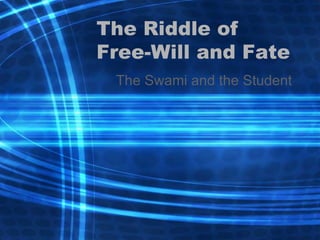The Riddle of Free-Will and Fate
- 1. The Riddle of Free-Will and Fate The Swami and the Student
- 2. Student: As a student of the Vedanta philosophy, the problem of the eternal conflict between fate and free-will troubles me. What are their respective provinces and how can the conflict be avoided?
- 3. Swami: ŌĆ£ If presented in the way you have done it, the problem would baffle even the highest of thinkers.ŌĆØ
- 4. Student: What is wrong with my question? I only stated the problem and did not even explain how I find it to be a difficult one.
- 5. Swami: ŌĆ£ Your difficulty arises in the very statement of the problem.ŌĆØ
- 7. Swami: ŌĆ£ A conflict arises only if there are two things. There can be no conflict if there is only one thing.ŌĆØ
- 8. Student: But here there are two things, fate and free-will.
- 9. Swami: ŌĆ£ Exactly. It is this assumption of yours that is responsible for your problem.ŌĆØ
- 10. Student: It is not my assumption at all! How can I ignore the fact that the two things exist as independent factors, whether I grant their existence or not?
- 11. Swami: ŌĆ£ That is where you are wrong again.ŌĆØ
- 12. Student: How?
- 13. Swami: ŌĆ£ As a reader of Karma Yoga, you must know that fate is nothing extraneous to yourself, but only the sum total of the results of your past actions. As God is but the dispenser of the fruits of actions, fate, representing those fruits, is not his creation but only yours. Free-will is what you exercise when you act now.ŌĆØ
- 14. Student: Still I do not see how they are not two distinct things.
- 15. Swami: ŌĆ£ Have it this way. Fate is past karma; free-will is present karma. Both are really one, that is, karma, though they may differ in the matter of time. There can be no conflict when they are really one.ŌĆØ
- 16. Student: But the difference in time is a vital difference which we cannot possibly overlook.
- 17. Swami: ŌĆ£ I do not want you to overlook it, but only to study it more deeply. The present is before you and, by the exercise of free-will, you can attempt to shape it.ŌĆ£
- 18. Swami: ŌĆ£ The past is past and is therefore beyond your vision and is rightly called the unseen (adrishta).ŌĆ£
- 19. Swami: ŌĆ£ You cannot reasonably attempt to find out the relative strength of two things unless both of them are before you. ŌĆ£
- 20. Swami: ŌĆ£ But, by our very definition, free-will, the present karma, alone is before you and fate, the past karma, is invisible.ŌĆØ
- 21. Swami: ŌĆ£ Even if you see two wrestlers right in front of you, you cannot decide about their relative strength. For, one may have weight, the other agility; one muscles and the other tenacity; one the benefit of practice and the other coolness of judgment and so on. We can go on building arguments on arguments to conclude that a particular wrestler will be the winner. But experience shows that each of these qualifications may fail at any time or may prove to be a disqualification. ŌĆ£
- 22. Swami: ŌĆ£ The only practical method of determining their relative strength will be to make them wrestle. While this is so, how do you expect to find by means of arguments a solution to the problem of the relative value of fate and free-will when the former by its very nature is unseen!ŌĆØ
- 23. Student: Is there no way then of solving this problem?
- 24. Swami: ŌĆ£ There is a way. The wrestlers must fight with each other and prove which of them is the stronger.ŌĆØ
- 25. Student: In other words, the problem of conflict will get solved only at the end of the conflict. But at that time the problem will have ceased to have any practical significance!?
- 26. Swami: ŌĆ£ Not only so, it will cease to exist.ŌĆØ
- 27. Student: That is, before the conflict begins, the problem is incapable of solution; ŌĆ” and, after the conflict ends, it is no longer necessary to find a solution.
- 28. Swami: ŌĆ£ Just so. In either case, it is profitless to embark on the enquiry as to the relative strength of fate and free-will.ŌĆØ



























